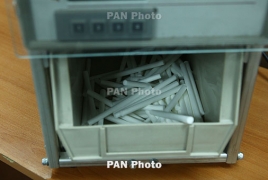
Parents who smoke cigarettes put their children and others around them at risk for bronchitis, pneumonia and a variety of other ailments. But a new study offers another method to help them quit lighting up, UPI says.
Researchers tested a smoking cessation program in five states in the South and the Midwest, finding it had success in helping some parents to kick the habit, according to research published Monday in JAMA Pediatrics.
About 58 million non-smokers in the United States take in secondhand smoke, including 14 million children between ages 3 and 11, according to the Centers for Disease Control and Prevention. And roughly one in five babies born to mothers who smoke while pregnant will have a low birth rate.
"The people who are most likely to have another pregnancy are the ones who already have a baby and are coming into the pediatrician's office," Emara Nabi-Burza, a researcher at Massachusetts General Hospital for Children and lead author of the study, said in a news release. "If we want to prevent smoking during pregnancy, one of the best strategies is to get parents of young children to quit."
The researchers tested an intervention called the Clinical Effort Against Secondhand Smoke Exposure to help parents quit smoking. The program included nearly 8,200 parents from Indiana, North Carolina, Ohio, Tennessee and Virginia.
After bringing their children to doctor's appointments, parents could opt to answer questions from an electronic survey about whether they wanted to quit smoking and provided their nicotine patches or gum to help with that effort.
In addition, the pediatricians offered parents a chance to enroll in their state's quitline and the national SmokeFreeTXT. Finally, parents received motivational texts from the pediatricians to quit smoking, whether they opted to participate in other aspects of the intervention or not.
Of parents who completed the survey, just over 44 percent received "meaningful treatment," with the intervention helping to reduce smoking among parents by 2.7 percent.

